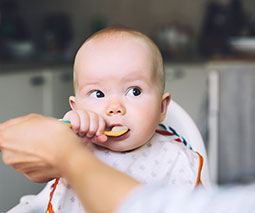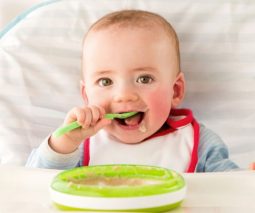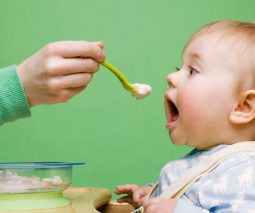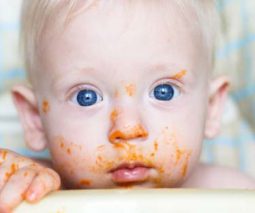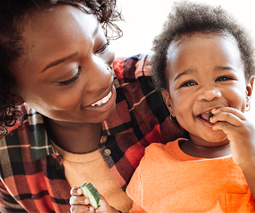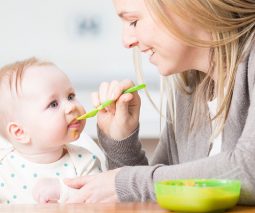Open wide! The busy parent’s guide to feeding baby solids
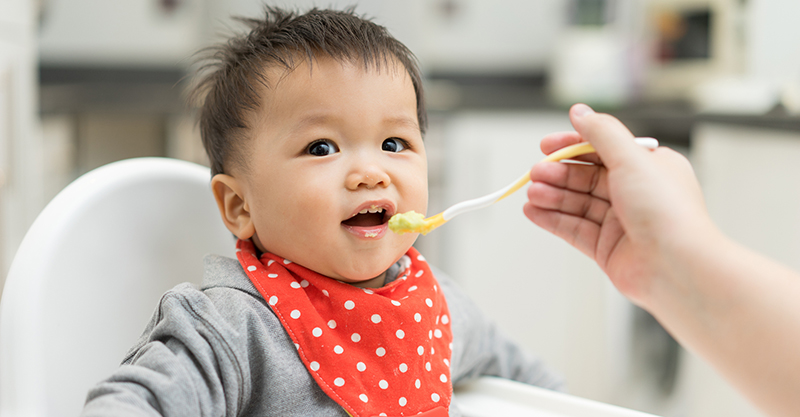
Babies grow so fast and before you know it, they enter the world of eating actual solid food! Around the age of six months, your little one will require further sustenance that they are unable get from breastmilk or formula alone.
As a general rule, it’s a good idea for baby’s first food to be rich in iron to ensure optimal brain development, with an iron-fortified rice cereal often being baby’s first food.
After that, there’s a kitchen full of options so it’s totally understandable if you feel a little overwhelmed when it comes to introducing baby to solids. To make things easier, here are some simple tips and tricks to make mealtimes stress-free for both you and your baby:
1. Foods that do and don’t freeze well
It’s helpful to know what foods freeze best before you start doing any batch-cooking, because some don’t taste great, or have a strange texture, after they’ve been defrosted.
Foods that freeze well include:
- Blueberries
- Broccoli
- Cauliflower
- Carrots
- Beans
- Peaches
- Peas
- Sweet potato
- Pumpkin
Most cooked meats also freeze well.
Foods that don’t freeze well include:
- Bananas
- Pears
- Avocado
- Kiwi fruit
- Cucumbers
2. Ice-cube tray trick for freezing
A simple method for storing purees is to pour the mixture into an ice-cube tray and then pop it into the freezer. Once the puree is frozen, pop the cubes out of the tray and then seal them into a zip-lok bag, date the bag with a Sharpie and put them straight back in the freezer.
Not only is this an easy way to store baby’s food, it’s also reduces wastage because you can just defrost the few cubes you need a couple of hours before serving them to baby. Just make sure you reheat the food throughly and throw away anything that hasn’t been eaten after six weeks. And remember – never refreeze food once it’s been defrosted.
3. Finger food hacks
After mastering the art of eating purees from a spoon (more or less!), your baby will be ready for more textures and finger foods.
A simple fuss-free way to incorporate finger foods into your baby’s diet is to give them a little bit of whatever you’re having; providing it is wholesome and nutritious. Wholemeal toast fingers, cheese slices, stir-fried or steamed veggies, scrambled eggs, full fat yogurt, wholemeal pasta and even oat porridge made with sliced fruit are all simple and healthy ideas that encourage exploration and provide ample nutrition to your baby.
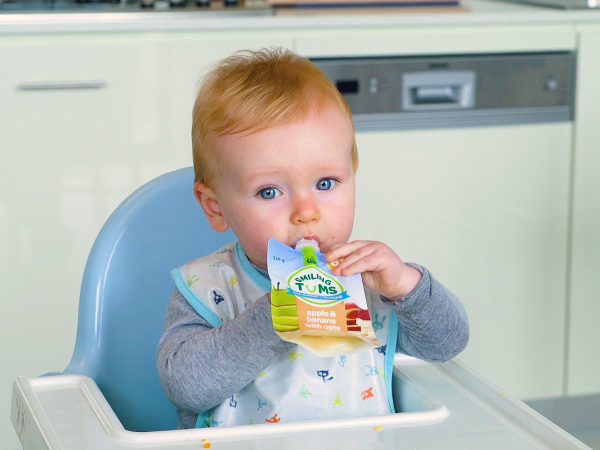
4. Helpful tools and tricks
When your baby starts solids you don’t need to go and fork out lots of money on gadgets. A good old-fashioned stick blender works well for pureeing foods, and in no time at all even a fork to mash with will suffice. Food can not only be steamed but you could also try roasting it, too.
Items that do come in handy though, are bibs with scoops for catching food and an easy-to-clean high chair. If it can be easily put outside and onto the grass to be hosed off, then you’re onto a winner. The less crevices for food to hide in the better. The family dog also comes in handy during the introduction of solids too; they’re the perfect clean-up companion when babies start learning how to fling their food around … just sayin’ from lived experience!
Small non-breakable containers to store purees in can be useful when out and about too, and don’t forget the wipes. You always need the wipes.
5. Have a reliable fall-back solution on standby
Some days it can all get a bit much, so it can be helpful to have pre-prepared baby food on stand-by in the pantry to serve as back up. Food pouches are particularly handy to have because they are just as perfect at home as when you’re out and about.
Look for a brand like Woolworths Smiling Tums that has a wide range of sweet and savoury pouches. With no added sugar – they’re naturally sweetened with fruit or veggies – no added salt, and no artificial colours, flavours or preservatives, they provide an excellent nutritious option.
6. Remember to remain calm and take your time
Meal times are meant to be a time for family to be together and enjoy each other’s company. Babies happen to be really good at gauging other people’s emotions, and they feed off them too. So if you’re stressed and frustrated, don’t be surprised if your baby is feeling the same way. Early food adventures are all about exploring and experimenting, so make sure you remain calm and try and be as relaxed as possible. This will benefit everyone. It’s best to start slow, and introduce foods in a no-pressure environment. After all, eating should be an enjoyable experience for the whole family.
This post is sponsored by Woolworths Smiling Tums.
